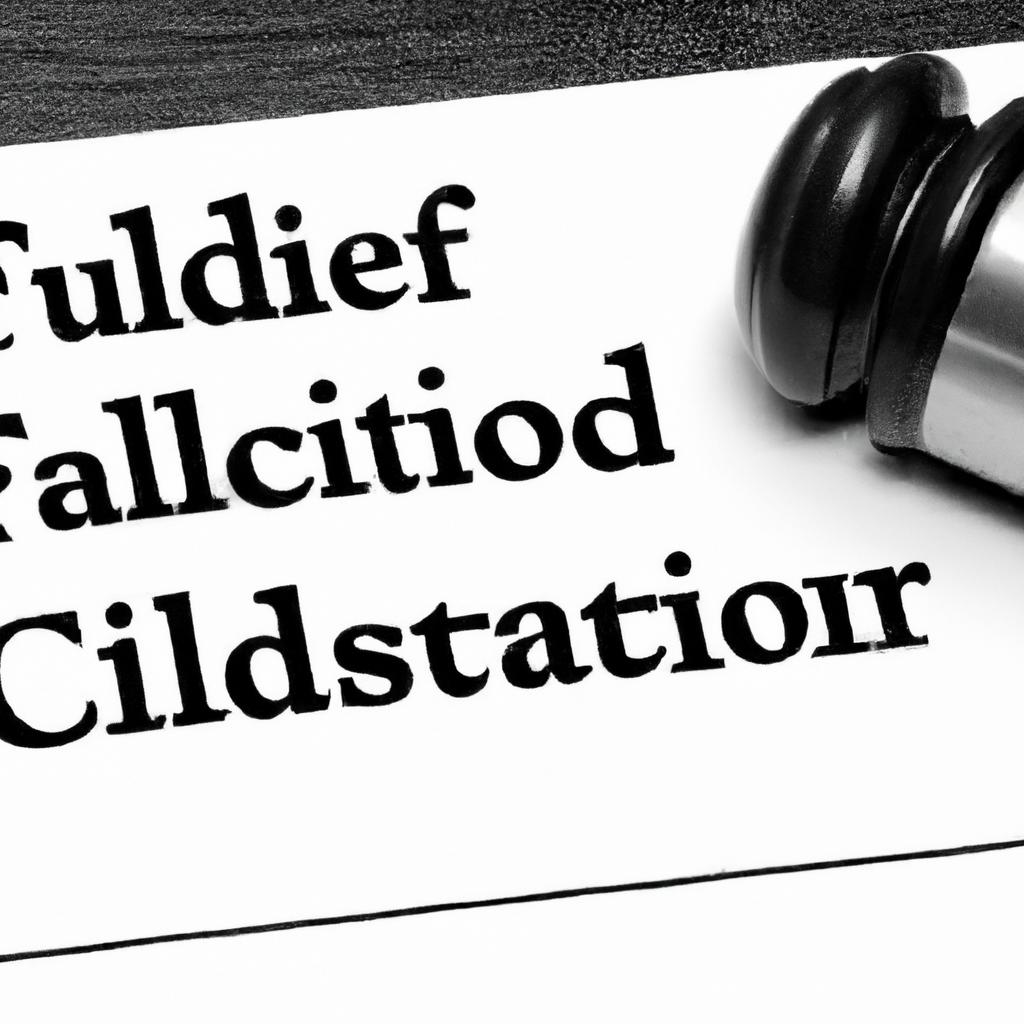As the sun dips into the Pacific, engulfing Californian beaches in hues of red and gold, another onslaught of questions storm the labyrinth of a troubled mind – to divorce or not to divorce? And if ‘to divorce’ be the eventual answer, then who prefers the paperwork? Who dials the courthouse? Who initiates the sequence of legal procedures that will rip two lives apart? Welcome to a journey that navigates the turbulent ocean of divorce laws in the Golden State, a discourse that seeks, if not for solace, then for clarity, on the usual dilemma - does it truly matter who files for divorce in California? Join us as we excavate the truth from the layers of regulations, and attempt to serve as your lighthouse in this storm.
Table of Contents
- Understanding the Divorce Process in California
- Does the Petitioner Have an Advantage in California Divorce?
- How Does Filing First Impact Divorce Proceedings?
- Negotiating Fair Division of Assets Regardless of Who Files
- Child Custody Considerations: Is the Initial Filer Favored?
- Debunking Myths: Does Filing First Guarantee Victory?
- Helpful Tips for Respondents in Divorce Cases
- From Filing to Finalizing: A Comprehensive Guide to California Divorce
- Q&A
- Final Thoughts
Understanding the Divorce Process in California
Embarking on the divorce journey in sunny California requires an understanding of both fundamental and intricate legal processes. The complexity of the journey depends on the nature of assets involved, duration of the marriage, and whether or not there are children in the mix. To commence proceedings, either spouse must have been a California resident for a minimum of six months. The initiating spouse, legally referred to as the ‘petitioner’, files for divorce by submitting a ‘Petition for Dissolution of Marriage’ to the county court where either spouse resides.
Once filed, the ‘petitioner’ then serves the other spouse, ‘the respondent’, with the papers. There is then a mandatory waiting period of at least six months from the date of service before the divorce is officially finalized. Division of property in California adheres to the community property law, meaning all income and assets acquired during the marriage are equally owned by both spouses and are subsequently divided equally. Responsibilities pertaining to finances, children, and marital debts are determined and established in the final divorce decree. Typically, these can include:
- Alimony/Spousal Support: One spouse may be required to provide financial support to the other for a specified period.
- Child Custody and Visitations: Arrangements detailing which parent the children will live with, and the schedule of visitations for the non-custodial parent.
- Child Support: Ongoing, periodic payment made by a parent for the financial benefit of a child, typically occurring post-separation or divorce.
- Division of Property: A fair split of all assets including cash, real estate, investments, pension plans, and businesses.
- Division of Debt: Allocation of financial obligations accrued during the marriage including mortgage, credit card debt, or unpaid loans.
The divorce process in California can be complicated and emotionally challenging. However, with detailed information, legal guidance, and a willingness to compromise, both parties can navigate this challenging phase with dignity and grace.
Does the Petitioner Have an Advantage in California Divorce?
In the Golden State, the process of marriage dissolution is governed by its own unique set of laws and regulations. Some people may assume the person who initiates the divorce, the petitioner, holds the upper hand and may benefit more from the proceedings. However, does this really hold true in divorce cases in California?
Equal Treatment of Parties
In California, both the petitioner and respondent are treated on an equal footing during the divorce proceedings. The court operates with a strong belief in the equitable treatment of both parties, without any prejudice towards the person who filed for divorce first. California is a ‘no-fault’ state, implying a spouse doesn’t need to prove the other is to blame for the breakdown of the marriage. This minimizes any possible advantage linked to being the petitioner. Here are some of the factors that the court considers equally for both parties:
- Property rights and its equal division
- Child custody and visitation rights
- Spousal and child support
Perks of Being the Petitioner
While generally the court treats both parties equally, there may be some situational advantages to being the petitioner. One advantage can be the opportunity to present the case first in court. This could potentially influence the court’s perspective, as first impressions can have a psychological impact. Another advantage might be that the petitioner typically has more time to prepare since the decision to divorce is typically made prior to the filing. However, these advantages are quite circumstantial and do not guarantee a favorable outcome. Circumstances like these are considered:
- Case presentation order
- Time for preparation
- Potential to frame the case narrative
In conclusion, while there can be situational advantages to being the petitioner in a divorce in California, these don’t necessarily result in a more favorable outcome. The court is chiefly concerned about ensuring a fair and equitable treatment of all parties involved.
How Does Filing First Impact Divorce Proceedings?
Initiating a divorce can be a daunting task loaded with emotional turmoil, legal complexities, and logistical challenges. However, an often overlooked consideration during this process is the strategic advantage – or disadvantage – one could potentially gain by being the first to file for divorce. Let’s explore this topic.
The party that files for divorce is commonly referred to as the petitioner or plaintiff, and the other party as the respondent or defendant. When you make the first move, you have the benefit of thoroughly preparing your case before the process starts. Benefits of filing first include but are not limited to:
- Time management: Filing first is like a head start in a race; you have extra time to prepare, gather necessary documents, and source an attorney.
- Choice of Jurisdiction: This especially applies if you and your spouse reside in different areas. The jurisdiction can impact facets of the divorce like child custody, asset division, and more.
- Initial narrative control: The filing documents set up an initial narrative. If you file first, you get to frame the issues from the jump and tailor the narrative of the divorce proceeding.
Nonetheless, this doesn’t mean you should rush into filling out the paperwork. It may be beneficial to have a strategic plan in place before proceeding. Filing first might also have a few disadvantages too, this could include being seen as the instigator or responsible, and in some cases, increased legal fees. Ultimately, the decision to file first should be carefully considered with the help of a trusted legal professional. Every divorce case is unique and often, the order of filing will not have a significant impact on the outcome.
Negotiating Fair Division of Assets Regardless of Who Files
When it comes to parting ways on mutual terms, it’s critical that both parties walk away feeling that the division of property is fair and just. Regardless of whether you or your partner initiated the proceedings, the ultimate goal should be a balanced outcome. In heart-wrenching circumstances, it may be daunting to consider bargaining the division of assets, but it is both a necessity and a right.
Here are a few tips to keep in mind. Negotiation doesn’t mean submission, but understanding and protecting your interests. Remembering the big picture will help you avoid getting stuck on minor points. It’s vital to be realistic about the value of assets, without letting emotions cloud your judgement. Finally, remember to get help from professionals since legal professionals and mediators can provide valuable advice and insight.
Understanding the laws in your jurisdiction and the tax implications of your decisions is crucial. This ensures that you make informed and educated decisions when converting a joint estate into two individual estates. It might be tempting to rush through this process to expedite closure, but it’s necessary to take your time.
Furthermore, familiarizing yourself with the estate’s entire value can be beneficial. This includes not only tangible possessions but also bank accounts, retirement funds, investments, and other forms of property. Finally, keep open lines of communication with your ex-spouse. Effective communication can make this process less stressful and can lead towards a fairer division of assets. Reaching a mutually satisfactory agreement is the ultimate aim, establishing a foundation for future interactions, particularly if children are involved.
Child Custody Considerations: Is the Initial Filer Favored?
It’s a commonly held belief that the parent who initially files for custody has the upper hand. However, this is somewhat of a myth. The legal system, not known to have a particular bias towards the initial filer, strives to make decisions in the best interest of the child. Nonetheless, from another angle, the initial filer may have the advantage of extra time to prepare their case.
As you delve deeper into the complexities of child custody, the following factors are significantly more influential than who files first:
- Parent-child relationship: The emotional connection between the child and parent significantly affects the custody decision.
- Financial stability: The court needs to ensure that the custodial parent can financially support the child.
- Child’s preference: If the child is mature enough, their preference may be considered, assuming it aligns with their best interests.
- Parent’s living situation: The court may look favorably upon the parent who can provide a positive and stable living environment.
While some may argue that being the initial filer for custody provides a head start, it’s crucial not to rush simply to stake first claim. Instead, potential custodial parents should take time to plan an effective custody strategy that best serves their child’s welfare.
Debunking Myths: Does Filing First Guarantee Victory?
The courtroom is no roulette table where the first player has a statistical advantage. Similar to any game of skill, the outcome of divorce proceedings isn’t determined by the chronological order of filing instead it is shaped by facts, applicable legal principles, and occasionally, personal narratives. A widely circulated myth links the act of filing first for divorce to the likelihood of emerging victorious in disputes, suggesting that the early bird gets not just the worm, but a substantial piece of the marital assets too. However, legal experts and empirical data suggest otherwise.
Getting a head start doesn’t necessarily mean winning in the end. Courts base their decisions on equity, law and facts presented. Ergo, the spouse who files first wouldn’t necessarily have an upper hand unless they have a significantly stronger case. Here is what really matters:
- Facts about finances: A substantial determinant of divorce proceedings outcome is the financial status of the couple. He who has the gold doesn’t always make the rules; finances get split according to numerous factors like earning capacity, financial needs, and responsibility towards children, if any.
- Quality of legal representation: Good counsel does wonders – an experienced, skillful attorney can tilt the scales. It isn’t about who files first but about who argues best.
- Kids on the balance: Child custody is an emotionally loaded issue; who gets custody and/or visitation rights is determined on the child’s best interest, not who filed first.
Helpful Tips for Respondents in Divorce Cases
Navigating the deeply emotional and logistically complex landscape of a divorce is no small feat. Luckily, we’ve compiled some practical advice to assist you in mitigating stress and making smart decisions during this transit. First and foremost, it’s essential to retain a qualified, experienced attorney who can guide you through the process. Make sure you communicate openly and candidly with your legal representative about your goals and concerns. Also, always carry necessities when meeting your attorney, like key documents (financial records, real estate deeds, etc.), a comprehensive list of marital assets and debts, and any other pertinent information.
Prepare yourself for the eventualities of the process. It’s not a sprint; it’s a marathon. Take care of your mental, emotional, and physical health. Being proactive about your wellbeing enables you to make sound decisions and cope with the stresses that come with a divorce. Keep communication with your former spouse as cordial as possible. This is especially important if you have children. Discussing custody, visitation, and support decisions in a respectful way can help to minimize any negative impacts on them. Don’t broadcast your divorce drama over social media. It may not only escalate the situation but also potentially be used against you in a court of law. Lastly, remember that this too shall pass. Life after divorce can be filled with growth, discovery, and new beginnings. Keep looking ahead with a positive mindset!
From Filing to Finalizing: A Comprehensive Guide to California Divorce
Navigating through the complexities of a divorce can be overwhelming. Between bits of legal jargon, numerous forms to fill, and a myriad of decisions to be made, the process may feel next to impossible. Our comprehensive guide is here to help, breaking down all the stages of a California divorce, from filing to finalizing, so that you are not left in the dark.
Commencing the Process: Filing for divorce is typically the first step and this involves completing certain forms, namely the Petition and Summons. Petition is a document detailing your grounds for divorce as well as your terms. Summons is a form that notifies your spouse of the divorce. It is extremely important that you fill these forms correctly. Once filled, you must then “serve” these to your spouse which is essentially a formal way of providing them the divorce papers. This might sound simple enough, but each form has its own intricacies which must be borne in mind.
As your divorce progresses, you may find that there’s a lot more to it than simply splitting everything in half. You may face issues involving division of property, debts, assets, spousal support, child custody, and many more. In these instances, it is important to keep your focus and handle each situation step by step. Our guide enlists all these aspects, providing you with key insights on how to handle each one of them, ensuring nothing is missed out. By staying organized, understanding the complex aspects of California law, maintaining open communication with your spouse, and ideally, hiring a good divorce lawyer, the process of finalizing your divorce can be made smoother.
Q&A
Q: Why should I be interested in knowing who files for divorce first in California?
A: It’s an important question considering spouses may have different perceptions about the impact of who initiates the proceedings. Familiarity with the process helps to take an informed decision and plan for the consequences.
Q: Does the spouse who files for divorce first gain any legal advantages in California?
A: Contrary to popular belief, there’s no significant legal advantage conferred to the spouse filing for divorce first. California is a no-fault state, indicating that the court doesn’t consider who caused the dispute leading to the end of marriage.
Q: Is there any financial advantage if I file for divorce first?
A: Not intrinsically. However, the spouse who files first may have a bit more time and control over the initial preparations, like gathering of financial documents and seeking advice from a legal counsel.
Q: Does filing for divorce first reflect badly on me in the eyes of the court?
A: No, the judgment isn’t based on who initiated the divorce. The court primarily focuses on an equitable distribution of shared assets and, if applicable, the best interests of the child or children in child custody matters.
Q: Is there any psychological advantage for the one who files first?
A: It might offer some psychological benefits in terms of ‘taking control’ of the situation. However, the individual experiences may differ.
Q: Since California is a no-fault state, does it mean infidelity or other marital misconducts aren’t considered in divorce proceedings?
A: Being a no-fault state primarily means that one does not need to blame the other spouse for the failure of the marriage to get divorced. However, certain misconducts, like wasteful dissipation of marital assets or abusive behaviour, could potentially influence decisions on property division, spousal support, or child custody.
Q: Is it always better to file first for divorce?
A: Not necessarily. The decision to file first should be based on individual circumstances, not on perceived advantages. It’s always crucial to seek legal advice prior to making such a decision.
Future Outlook
In the complex dance of divorce, the question of “who files first” can seem like a pivotal moment, much as one might suppose the first move in a chess game to be. Yet, in the sprawling landscape of the law, particularly in the golden state of California, it’s really the strategies employed throughout the process by attorneys, and the details of your unique situation that truly determine the outcome. So move carefully, armed with knowledge, compassion, and meticulousness, remembering that this is just one piece of a much larger mosaic. Whatever path you tread, remember to seek guidance, to question, and understand every step along the way. Life holds the promise of many sunrises after this defining sunset, the horizon shaped not by who initiated the divorce, but how you navigate this transformational journey with self-respect, legality, and dignity.









